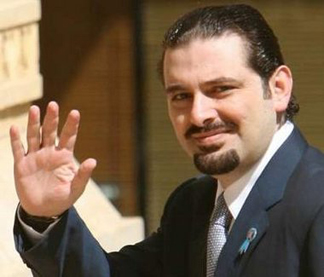
Saad Hariri
Arabic will die out if it is locked up in classrooms
by Achraf El Bahi, The National, April 08. 2010
In his inaugural address to parliament last December, the Lebanese prime minister Saad Hariri kept mispronouncing words and whole phrases in Arabic, smirking the entire time.
Not only did the Georgetown-educated, English-speaking Mr Hariri laugh at his mistakes, but he also cackled when Nabih Berri, the speaker of parliament, asked him if he needed someone to help him out.
Being bad at Arabic is almost like being bad at an obscure sport, say croquet: no one particularly cares if you fail to grasp the quaint and overly complex techniques needed for mastery of the subject.
In Lebanon, French is the language of the learned and the sophisticated. The same is true in Algeria, Tunisia, Morocco and other former French colonies in the Arab world. Failing to speak proper French in those countries is a handicap in professional and social life.
In some circles, it is fashionable to make mistakes in modern standard Arabic and rather chic to be unacquainted with the meaning of a word or expression. In Morocco, the French word francisant, (French-educated) has a positive connotation. If you are francisant, it does not matter if you cannot speak Arabic. The preposterous part is that a so-called Arabist does not get away with the same glory-in-incompetence should their French leave something to be desired.
Fluency in French and English in the Middle East and North Africa has come to imply intelligence, erudition and even affluence, even if that person struggles with Arabic.
Many Arabs feel that speaking modern standard Arabic, the form of the language taught at school, is something of a burdensome, if not embarrassing, endeavour. It is not the local dialect that they use at home and on the street, which they speak with ease.
Proficiency in Arabic, proper grammar, conjugation and a broad use of vocabulary are seen as the sole purview of language geeks. It is bizarre that they are looked down upon, while those Arabs who spent time ploughing through Chaucer and Coleridge, Rabelais and Pascal to become proficient in English and French are respected.
What has happened that once-proud Arabs, who once would kill or be killed for a single verse of poetry, gauge their level of intelligence by how little they know of their mother tongue? Perhaps, it is because true Arabic is no longer their mother tongue.
It is an obvious, if little known fact that modern standard Arabic is no longer anybody’s mother tongue. No one in the world speaks it as a native language. The 350 million people spread across the 22 Arab states learn this language in school in the same way they might learn French or English. They make horrendous mistakes when they write, read or speak it. Even many Arab Muslim senior citizens can barely understand a sentence of a Friday sermon because the preacher delivers his lecture in modern standard Arabic.
All Arabs know Arabic, but a Tunisian speaks Tunisian, a Libyan speaks Libyan, and an Egyptian speaks Egyptian. None of these is “proper” Arabic. Countless Arabs find that their friends from Morocco and Algeria may as well be speaking Greek when they speak in their native dialects.
True, these derivative languages bear a close resemblance to Arabic, but they are not, strictly speaking, Arabic. The extent to which they differ from pure Arabic is far greater than the comparitively minor difference between Kenyan and Scottish English.
A native tongue is – and some linguists may wish to differ – a language that you speak fluently. It is a language that defines who you are. No one faults an American or a Briton for the differences in their use of the English language. It is just how they speak and their distinct dialect defines them.
Arabs should not be asked to speak like the 10th-century poet Abu Tayyib al Mutanabbi. No one should expect English speakers to speak like Milton either. It is futile and fails to serve the ultimate purpose of language: ease of communication.
Languages die when they become stagnant. Latin has almost died out precisely because it was locked up in church bookshelves. Arabic, with its elasticity, rhetorical treasures and axiomatic wealth may suffer the same fate if its use is restricted to the classroom, the mosque, and the halls of government.
Arabic deserves a greater chance of survival than what it is currently being offered. Occasional events celebrating it will not push it into every day life. The language must get back in touch with the most mundane aspects of our lives. It must be allowed to grow and change, given room to breathe and stretch its legs out on the streets. Otherwise it will shrivel and die.
If you’re an Arab, ask yourself: how do you say “zipper†in your supposed mother tongue?